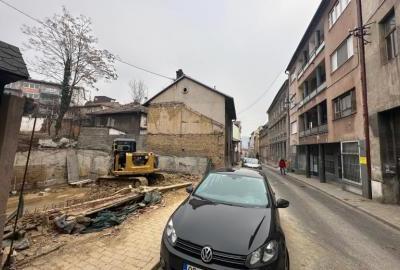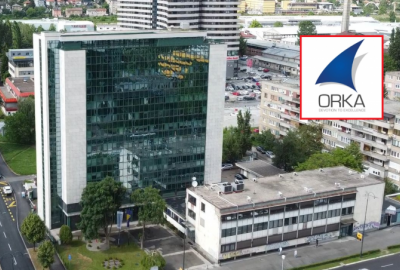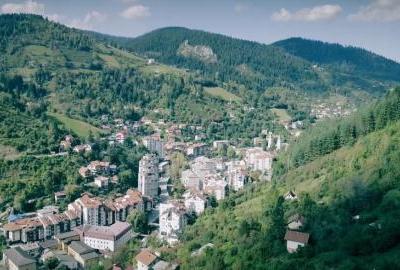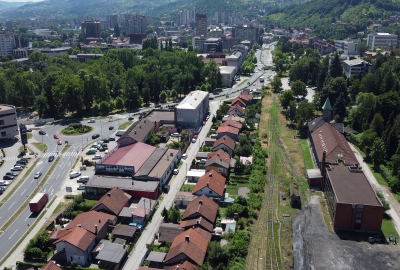Žurnal in English
When the Land Registry Burns: How Authorities in Bosanska Krupa Sold State Property
The draft law on state property, which was adopted by the Presidency of Bosnia and Herzegovina and submitted to parliamentary procedure, offers an opportunity for long-awaited regulation of ownership, management, and repurposing of state property. However, reactions from Republika Srpska entity in Bosnia and Herzegovina suggest minimal chances of its adoption. Examples from Bosanska Krupa indicate serious consequences due to the longstanding unresolved issues around state property, impacting local authorities, as well as individuals and companies.
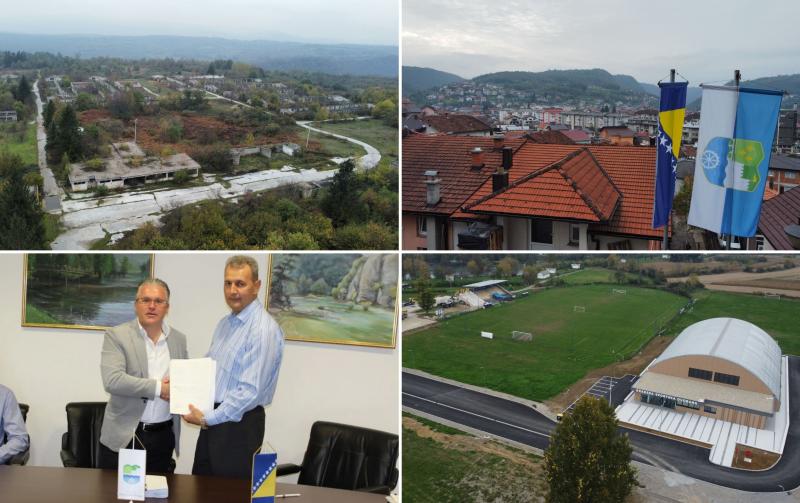
The Presidency of Bosnia and Herzegovina adopted the Draft Law on State Property on October 21. Members of the Presidency, Denis Bećirović and Željko Komšić, voted in favour, while Željka Cvijanović voted against it. The draft will now proceed to parliamentary review.
Nedim Ademović, a constitutional law expert, told Žurnal that the draft law provides a strong foundation for debate in the Parliamentary Assembly of Bosnia and Herzegovina.
"This draft addresses the issues of ownership, management, and use of state property. It regulates the mapping and registration of individual assets, their classification, and updates. It also proposes the establishment of a special agency to oversee state property. Furthermore, it outlines the basic principles for how Bosnia and Herzegovina, as a complex state, should divide roles related to state property to make the best use of these assets while fulfilling both the essential tasks of the state and society. I believe this has been largely achieved. This includes the right to repurpose state property. Currently, no one is allowed to take any action with state property beyond its intended use, as anything else would constitute abuse or overreach of authority!" Ademović explains for Žurnal.
Despite the existence of the Law on the Temporary Ban on Disposal of State Property, instances of misuse of state property have continued to surface. For example, in July, the Constitutional Court of Bosnia and Herzegovina overturned two decisions made by entity governments—the Federation of Bosnia and Herzegovina and Republika Srpska—that allowed forested state lands to be allocated or sold to private companies, such as Adriatic Metals in Vareš and Drvo Export on Jahorina.
The court emphasised that this is state property under a disposal ban and that the entities have no jurisdiction to dispose of it.
STATE PROPERTY OR PROPERTY OF THE CITY OF BOSANSKA KRUPA?
While Bosnia and Herzegovina awaits a resolution on state property issues, local governments occasionally attempt to trade or seize this property. One such case arises in the City of Bosanska Krupa, where it has yet to be determined who actually owns the disputed property—the state or the local government.
Two cases from this city illustrate the issue, one involving the former Pučenik farm. In mid-2016, then-Mayor of the Municipality (now the City of Bosanska Krupa) Armin Halitović and Jusuf Arifagić, owner of Arifagić-Investment, signed a contract to sell the dilapidated buildings and land in this area for a symbolic one convertible mark. At the time, this was presented as fulfilling all formal legal conditions to grant possession to the investor and start the construction of a modern Norwegian cattle farm.
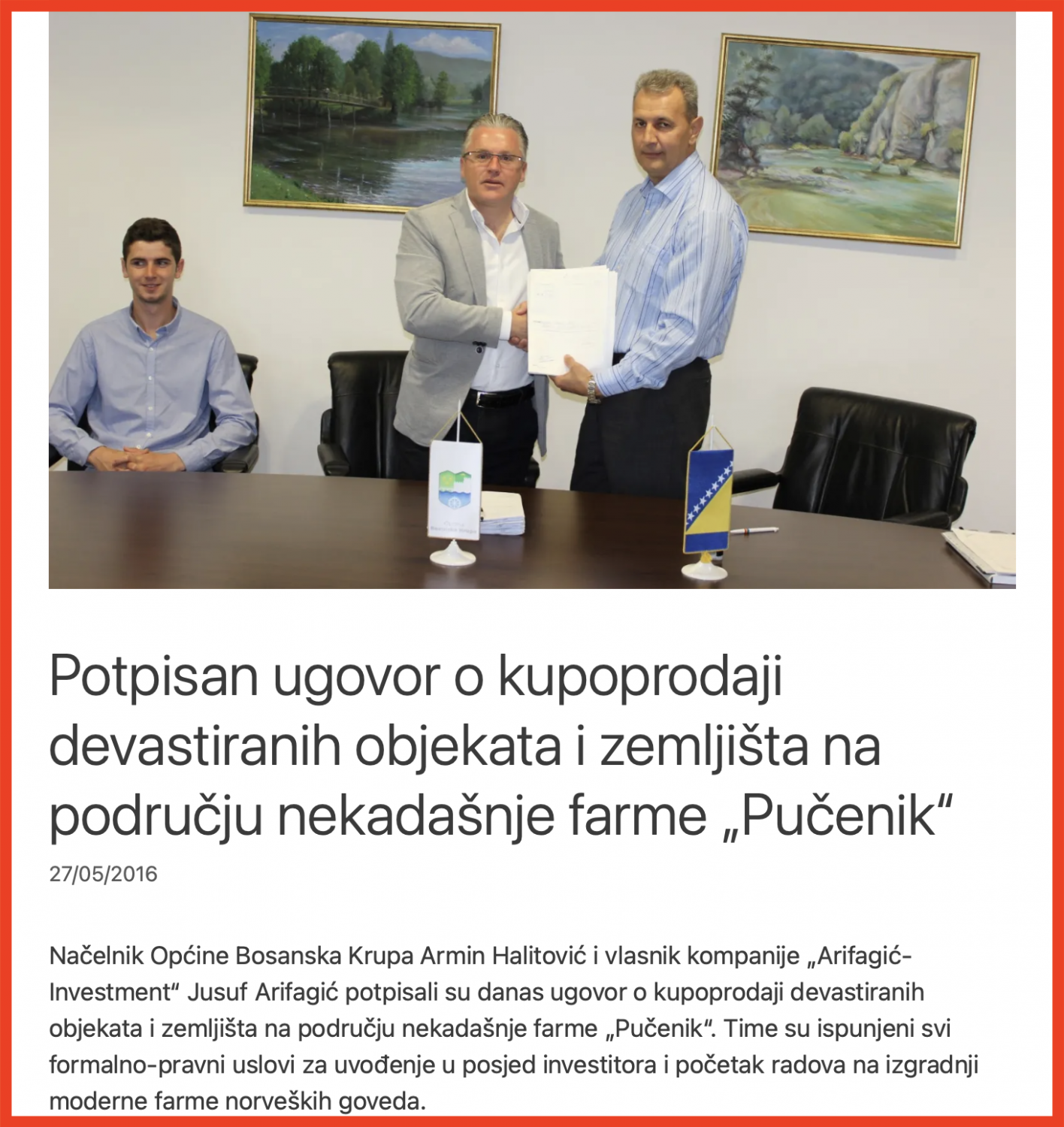
The company Arifagić-Investment, through the contract, committed to reconstructing, building, and putting the facilities into operation within five years from the date of ownership registration, as well as to continuously employ workers, hiring at least 200 able-bodied individuals from the employment bureau's records over the next five years.
More than eight years later, Žurnal journalists visited the site. The current condition can be seen in the attached photograph.
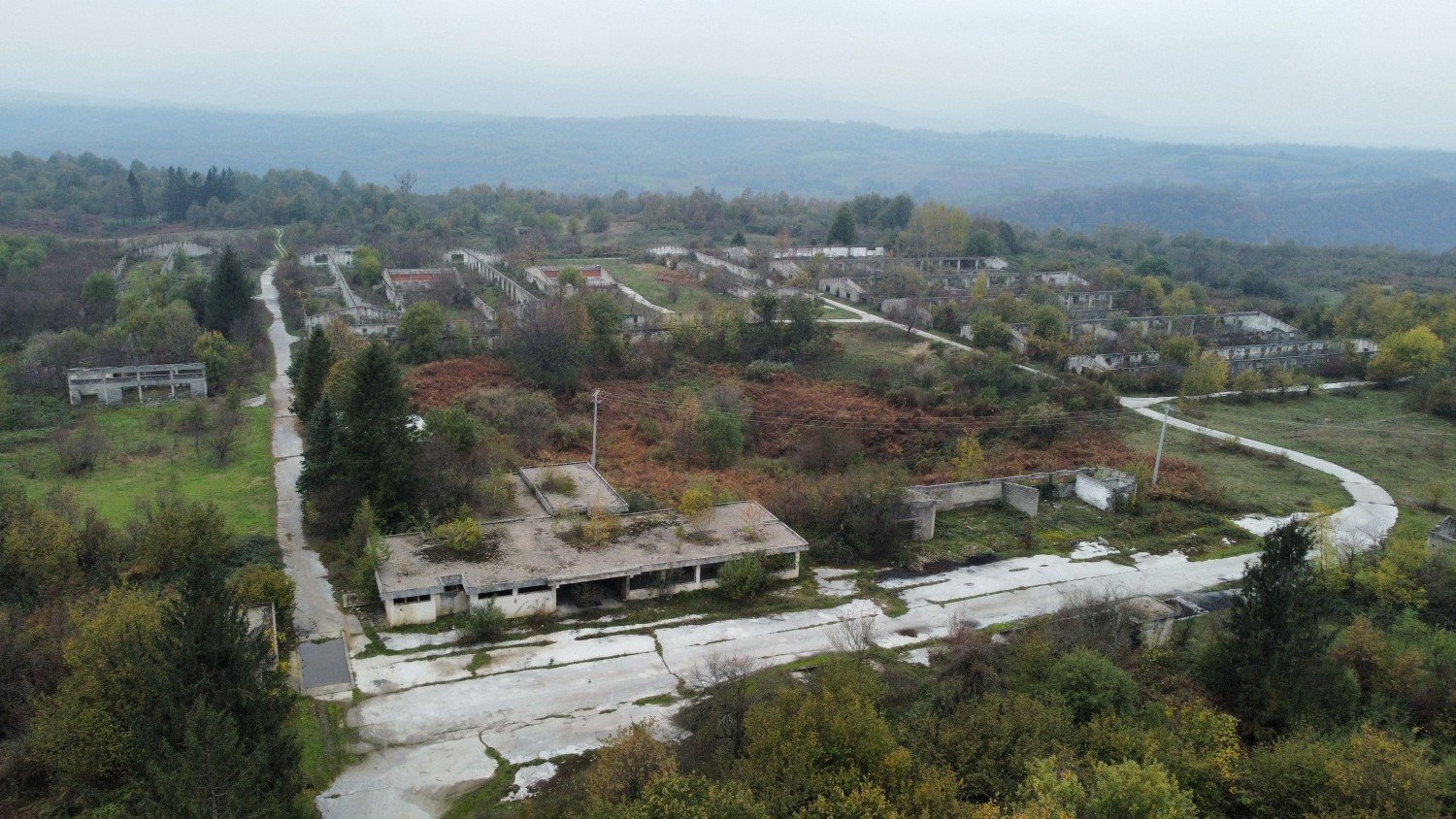
In search of answers as to why the promised commitments were not fulfilled, the first response came from the Legal Department of the City of Bosanska Krupa. Their response confirmed suspicions that the city may have traded state-owned property, specifically state agricultural land.
The Legal Department filed a lawsuit to nullify the concluded contract, stating that the sale involved 8.5 hectares of state agricultural land at the former Pučenik pig farm site.
"This is explicitly prohibited by the provisions of the Federation of BiH Agricultural Land Law and the Temporary Ban on Disposal of State Property Act. The Constitutional Court of BiH has also made it clear in its rulings that the titleholder of state agricultural land is the state of BiH and is not for sale. Following the filing of the lawsuit to annul the state agricultural land sale contract, Bosnia and Herzegovina and the Federation of BiH, represented by the BiH Attorney General's Office and the Federal Attorney General’s Office, joined the lawsuit on the plaintiff’s side", the response to Žurnal states.
No court decision has yet been made in this case. In response, Arifagić-Investment filed a counterclaim for eight million BAM, citing their inability to use the agricultural land. In their detailed response to Žurnal, they clarified the matter:
"The amount, approximately 7,500,000 BAM, represents expected profits from the land leased under a contract for around 265 hectares over 5 or 10 years. Shortly after signing the contract, Arifagić-Investment invested around 200,000 BAM, including approximately 110,000 BAM for constructing a new transformer station, as electricity—along with road access and water supply—is a critical requirement for any reconstruction activities".
A court decision has also not been reached in this case. The company concluded that the matter is complex, both factually and legally. They reject claims that the land is state agricultural property, though they note that a latent conflict between the Legal Department and the (mayor’s) office has been evident throughout the project.
To clarify, we also spoke with Mayor Armin Halitović, a signatory of the contract. We asked him why the City of Bosanska Krupa sold state agricultural land:
"We didn’t sell state agricultural land. We sold land owned by the then Municipality of Bosanska Krupa, now the City of Bosanska Krupa", he told Žurnal.
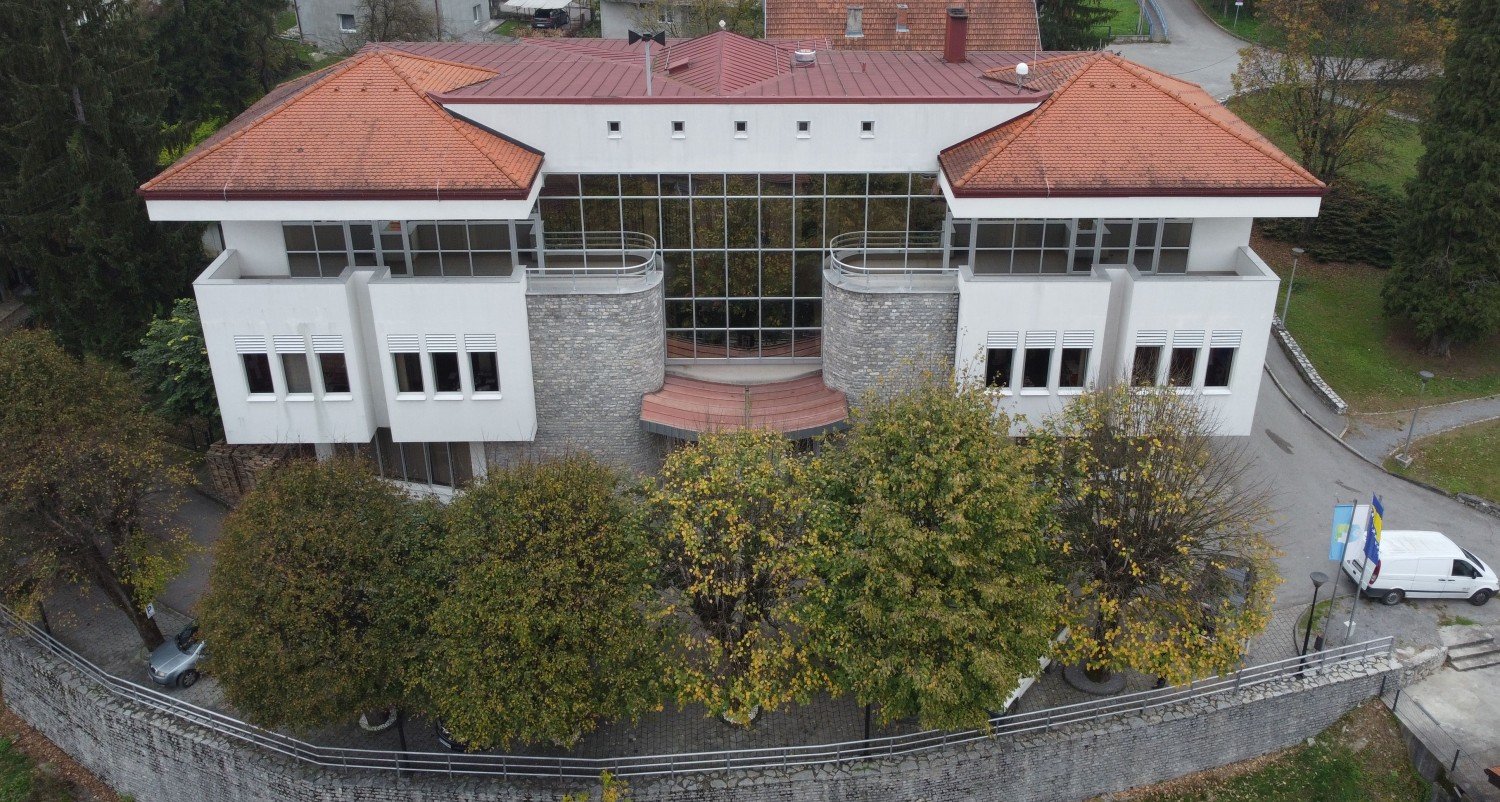
So where do the claims that this is state land come from? Mayor Halitović sees the "culprit" in the City’s Legal Department: "They are influenced by opposition politics".
He draws a parallel to the newly built hall in the city. Žurnal previously reported that this hall was constructed on state agricultural land owned by the state and located within the river Una's water property. Consequently, the Ministry of Agriculture, Water Management, and Forestry of Una-Sana Canton, following a request from the BiH Attorney General’s Office to review the legality of the decision, annulled the decision that converted agricultural land for non-agricultural purposes.
The core issue was that the City of Bosanska Krupa failed to submit a land registry excerpt—a crucial legal proof of ownership of the agricultural land in question—when requesting the land conversion.
Halitović explains that in Bosanska Krupa, this isn’t even possible:
"Our land registry office burned down in 1942. We only have a cadastral survey that determines possession, not ownership. We are currently addressing this and expect to resolve it within the next two years. Here, it’s routine for legal transactions to use a cadastral record or an excerpt from the possession records. The entire legal process in cadastral municipalities Krupa 1 and Krupa 2 is based on the possession record, which we consider proof of ownership".
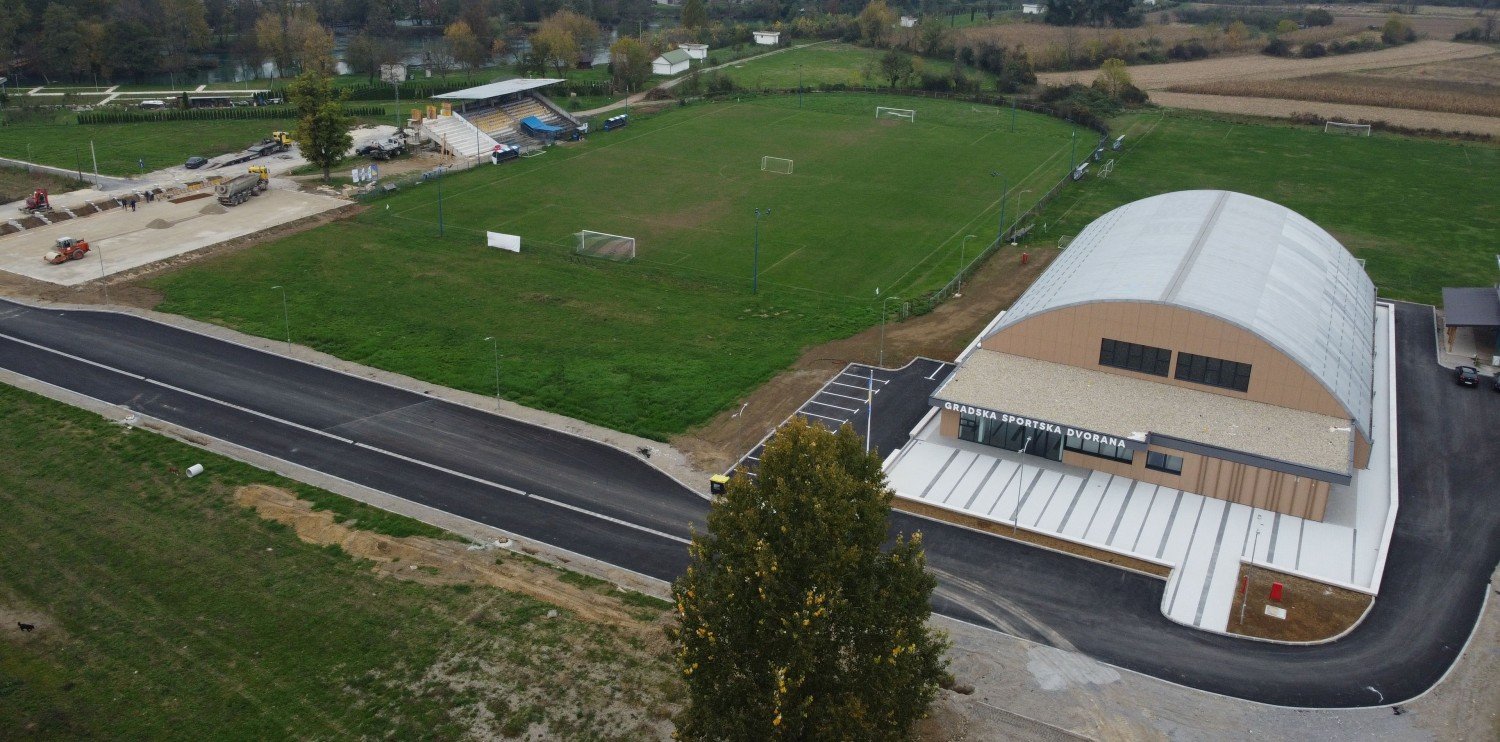
He particularly emphasises the issue of selective and inconsistent application of regulations:
"Since 1996, the Cantonal Ministry of Agriculture has been converting land based on the possession record. Then they annul the conversion for the City of Bosanska Krupa because we have a possession record. Yet, seven days later, they convert someone else's land from agricultural to construction purposes based on the possession record. This happens every day".
What is unusual is that the land on which the hall was built was even classified as agricultural, as there has been a sports field at that location since before the war. There were also pre-war plans to build a sports and recreational centre on this site.
"The issue is that the structures from the pre-war period were never officially planned. They remained unplanned. So, in the cadastral documentation, you have what you have, sometimes it states it was farmland. Because the structure was not planned. The responsible parties are the pre-war authorities in Bosanska Krupa. But this isn’t just about one structure; we are talking about all structures. None of the buildings constructed before the war are planned", Mayor Halitović assures us.
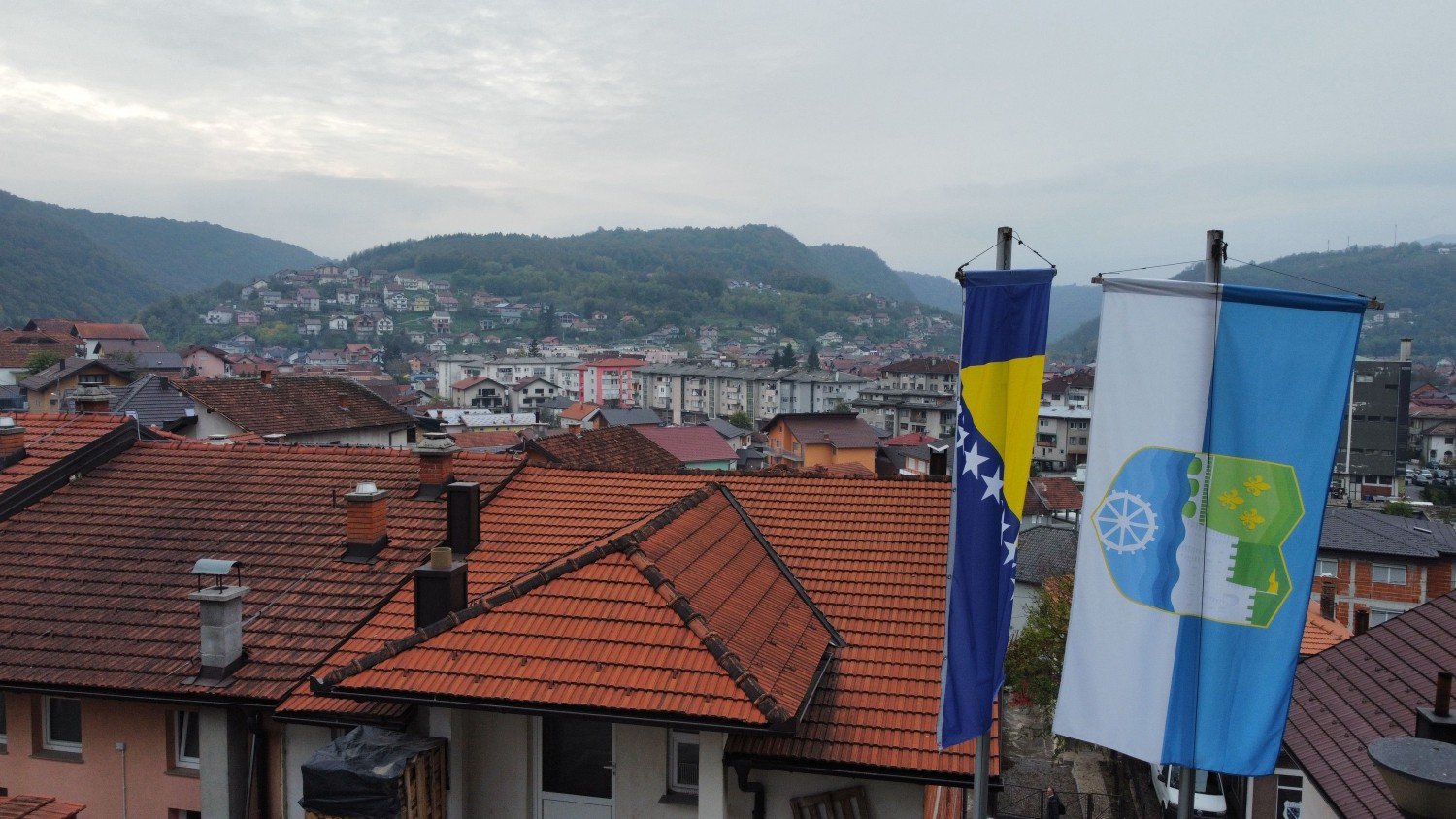
The City of Bosanska Krupa had the right to appeal the decision that annulled the conversion of agricultural land for non-agricultural purposes. The Federal Ministry of Agriculture, Water Management, and Forestry confirmed to us that the appeal was filed and that the administrative process is ongoing.
ENACTMENT OF THE LAW AS A PRECONDITION FOR RESOLVING THE ISSUE
Examples from Bosanska Krupa illustrate the real problems that authorities, as well as individuals and legal entities, face due to the unresolved issues regarding state property and the prohibition of its disposal. Nedim Ademović emphasises that our country and society have an urgent need for a state-level law on state property to be adopted.
"We should welcome any attempt to reach an optimal solution. The current deficit of such a fundamental law has enormous consequences for all of us. The state is not progressing on its European path, and we are not fulfilling our international legal obligations. Investments have stalled. International investors and financial institutions have particularly withdrawn. There is legal uncertainty for citizens and the state. Property and legal transactions are at risk. The state cannot offer a development strategy, and currently, no one benefits from this. Therefore, we must urgently respond and seek an adequate legal solution", he states.
The law should be adopted by the Parliamentary Assembly of Bosnia and Herzegovina, and it would regulate property rights and management of state property. The Law on the Temporary Prohibition of Disposal of State Property of Bosnia and Herzegovina, imposed by the Office of the High Representative in Bosnia and Herzegovina (OHR) back in 2005, is still in effect. At that time, it was stipulated that the ban would remain in force until the adoption of a new state law. Judging by the reactions from the Bosnian entity of Republika Srpska, whose authorities have attempted to adopt several laws on state property that have been annulled either by the OHR or the Constitutional Court of Bosnia and Herzegovina, the chances of passing the new proposal for the law on state property are minimal.
"Unfortunately, instead of responsible politics, we hear extremely retrogressive voices from Republika Srpska that evidently want to hold our state hostage to backward, ethno-nationalist, and anti-European policies. Every attempt to discuss this issue is rejected, denying the undeniable right of the state to resolve this matter through legislation and claiming that the state has no such right, which is absurd. However, constitutional arrangements, especially regarding ethnic and entity vetoes, allow this kind of retrogressive and unconstitutional policy to be processually abused to block the state and its functionality. This is, indeed, a problem", concludes Nedim Ademović.
(zurnal.info)





